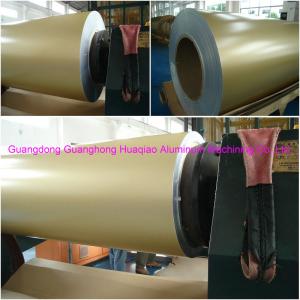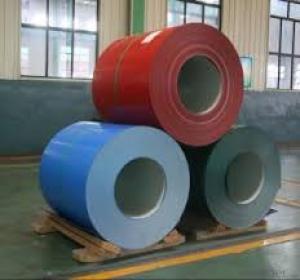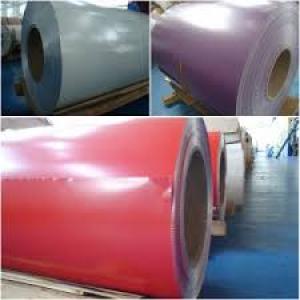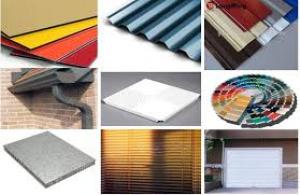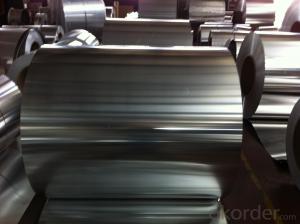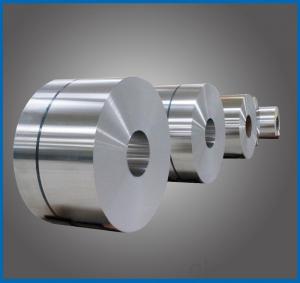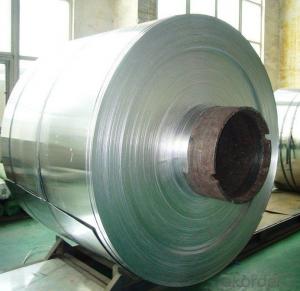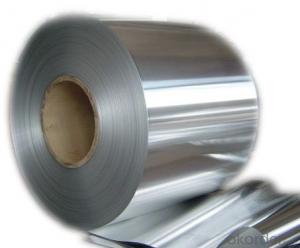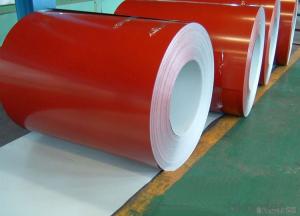Champagne gold color PVDF coated aluminum coils
- Loading Port:
- China main port
- Payment Terms:
- TT or LC
- Min Order Qty:
- 3 m.t.
- Supply Capability:
- 50000 m.t./month
OKorder Service Pledge
OKorder Financial Service
You Might Also Like
Features of PVDF AluminumCoil:
1. Adopting precision rolling coating technology,our PE coated coil can ensure excellent adhesive without coating omission.
2. For the PVDF coated aluminum sheet we produced,there are various colors for your choice.
3. Using infrared heating technology to protectenvironment from pollution.
4. Our coated aluminum coil has four-rollercoating line, uniform coating thickness and good features.
Raw Material of the PVDF Coated Aluminum Coil:
1. Aluminum Coil: high strength aluminum with alloyof AA1100 (aluminum alloy is available with AA3003, AA3005, AA5005 according tocustomer)
2. Surface Paint: PE, PVDF and special paints.
Performance and usage
PVDF coated aluminum coils are specially processedthrough the technics of roller coating and baking with precise paints fromBECKER INDUSTRIAL COATINGS in
Performance of the coating
Aluminum Thickness | Coating Thickness | MEK | T Bend | Impact | Adhesion | Pencil Hardness | Boiling Water Proof |
0.3-1.5mm | ≥25μm | ≥100 Times | ≤2T | 50kg•cm | 0 Grade | ≥HB | no change within 2 hours |
0.15-0.28mm | ≥25μm | ≥100 Times | ≤2T | 20kg•cm | 0 Grade | ≥HB | no change within 2 hours |
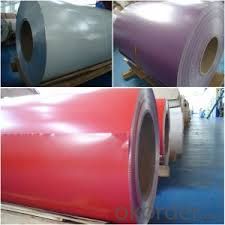
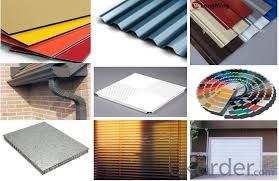
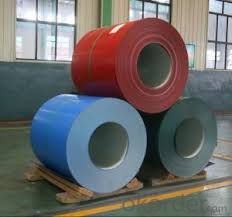
Color of Card
Our PVDF coated aluminum coil is made offluorine carbon resin, pigment, ester solvent after high temperature roastingand baking. The paint of this PVDF coated aluminum coils are solidified to dryfilm with super weather resistance. PVDF coating also can be classified astraditional PVDF and nanometer PVDF coating.
A. Traditional PVDF Coating, with KYNAR500 PVDF and two or three times forcoating and baking, has good properties of anti-acid, anti-alkali and isdurable in atrocious weather and environment, keeping 15 years no unwontedfading. In view of these facts, we recommend this PVDF coated aluminum coilsare applied for external wall cladding.
B. Nanometer PVDF Coating, which different with traditional PVDF, is the clearcoating. It contains nanometer element, which can protect panel from pollution,because nanometer has self-cleaning effect, it is easy to get rid of dust andpollution by raining or water.
Our color Coated Aluminum Coil Characteristics:
-High temperature resistant
-Weathering resistant
-Scrubbing resistant
-Sound insulation
-Acid or alkali proof
-Fireproof
-Light weight material is easy to construct and install
-Bright colors
-Easy molding process,not rusting etc.
PVDF coated aluminum coils Specification:
* substrates: Aluminium (AA 1100, 3003, 3004, 3105, 5006, 5052, 8011, etc), PET, etc.
* Thickness: Alu. 0.08~1.00mm
* Width: Maximum 1590mm
* Colors and finishes: Solid, metallic, stone/wood look, anti-graffiti, anti-static, anti-abrasion, spectra, wrinkle, etc.
* coating systems: Ployester, PVDF, FEVE, Epoxy, Polyamide, Polyurethan, etc.
* Further processing: Strips, cut, emboss, and packing.
IDEABOND color coated aluminium foil combines all advantages of modern coil-coating technology in our full-automatic production line. Our modern production is 4 coated in one with digital precision control, we can created pattern like Wood, stone, graphic as you want. The aluminium substrate gets degreased, chemically pre-treated and coated in a single production step which resulting in a high-quality uniform coatingreproducible at any time and a material which has been developed for easy processing for a variety of application.
- Q:What are aluminum coils used for?
- Aluminum coils are commonly used in various industries, such as construction, automotive, and HVAC, for their excellent thermal conductivity and corrosion resistance properties. They are primarily used for manufacturing heat exchangers, air conditioning systems, refrigeration units, and other heat transfer applications.
- Q:What is the reason for the grooves that go around the circumference of a tin/aluminium can? It can't be for grip because they're covered with paper anyway and i don't think it would make much difference.
- If they didn't, they would easily be crushed during shipment. It makes them much stronger to have the grooves. Norrie's got a good point.
- Q:What is the impact of alloy purity on the performance of aluminum coils?
- The purity of alloys used in aluminum coils has a significant impact on their performance. Alloy purity refers to the absence of impurities or contaminants within the aluminum material. One crucial factor affected by alloy purity is the mechanical strength of the aluminum coils. Impurities in the alloy can weaken the overall structure and reduce its tensile strength. Higher purity alloys tend to have better mechanical properties, allowing the coils to withstand higher loads and stresses without deformation or failure. Alloy purity also influences the electrical conductivity of aluminum coils. Impurities such as iron, copper, or silicon can increase the electrical resistance, leading to losses in electrical energy during transmission. Higher purity alloys have lower electrical resistivity, ensuring efficient power transmission and minimizing energy losses. Another critical aspect influenced by alloy purity is the corrosion resistance of aluminum coils. Impurities can act as catalysts for corrosion, reducing the coil's lifespan and durability. Higher purity alloys exhibit improved resistance to corrosion, making them suitable for various applications, including those in corrosive environments. Additionally, the thermal conductivity of aluminum coils is affected by alloy purity. Impurities hinder the efficient transfer of heat, reducing the overall thermal performance. Higher purity alloys have better thermal conductivity, allowing for effective heat dissipation and improved thermal management in applications such as heat exchangers or cooling systems. In conclusion, the impact of alloy purity on the performance of aluminum coils is significant. Higher purity alloys offer improved mechanical strength, electrical conductivity, corrosion resistance, and thermal conductivity. Thus, selecting alloys with higher purity levels is crucial for ensuring optimal performance and longevity of aluminum coils in various applications.
- Q:My favorite deodorant contains aluminum. It smells really good and it works really well.My mom doesn't like me using it because it contains aluminum.So I got aluminum free. It doesn't smell at all (I can't seem to find fragrant aluminum free deodorant) and it doesn't work as well, for some reason.I want to keep using the one with aluminum, but will it be harmful to me in the future?
- Aluminum, okorder /
- Q:Can aluminum coils be used for HVAC systems?
- Yes, aluminum coils can be used for HVAC systems. Aluminum coils are commonly used in HVAC systems as they offer several advantages over other coil materials. Firstly, aluminum is a lightweight material, which makes it easier to handle and install. This can result in lower installation costs and reduced strain on the structure of the HVAC system. Secondly, aluminum coils have excellent heat transfer properties. They efficiently transfer heat from the refrigerant to the surrounding air, which is crucial for the effective functioning of the HVAC system. Aluminum coils also have a high resistance to corrosion, which is particularly important in humid environments or areas with high levels of pollutants. Additionally, aluminum is a highly recyclable material, making it an environmentally friendly choice for HVAC systems. It can be easily recycled and reused, reducing the need for new material extraction and minimizing waste. Overall, aluminum coils are a reliable and efficient choice for HVAC systems, providing excellent heat transfer, durability, and environmental sustainability.
- Q:What are the different types of aluminum coils?
- There are several different types of aluminum coils available, each with its own unique properties and uses. Some common types include: 1. Plain Aluminum Coils: These coils are typically made from pure aluminum and are used in a variety of applications, including packaging, construction, and automotive industries. 2. Embossed Aluminum Coils: These coils have a textured or patterned surface, which adds aesthetic appeal and can enhance the grip or provide anti-slip properties. They are commonly used in architectural designs, signage, and decorative applications. 3. Color Coated Aluminum Coils: These coils have a protective coating applied to the surface, providing enhanced durability, weather resistance, and aesthetic customization. They are often used in building facades, roofing, and cladding systems. 4. Anodized Aluminum Coils: Anodization is an electrochemical process that forms a layer of oxide on the surface of the aluminum, making it more resistant to corrosion and wear. Anodized aluminum coils are commonly used in architectural applications, electronics, and automotive parts. 5. Pre-painted Aluminum Coils: These coils have a layer of paint applied to the surface, providing protection against weathering and adding color aesthetics. They are frequently used in the construction industry for roofing, siding, and insulation purposes. 6. Stucco Embossed Aluminum Coils: These coils have a raised pattern resembling stucco, which adds texture and enhances the strength of the aluminum. They are commonly used in refrigerators, air conditioners, and other appliances. 7. Clad Aluminum Coils: Clad aluminum coils consist of two or more layers of aluminum bonded together for enhanced strength, durability, or specific properties. They are used in various industries, such as aerospace, defense, and transportation. Overall, the choice of aluminum coil type depends on the specific application requirements, such as desired appearance, corrosion resistance, durability, and mechanical properties.
- Q:Aluminium forms layer of aluminium oxide when exposed to air. This prevents further reaction.However, isn't aluminium oxide an amphoteric oxide that can react with both acids and alkalis?
- Aluminium forms layer of aluminium oxide when exposed to air. This prevents further reaction WITH AIR.
- Q:What are the different pre-treatment methods for aluminum coils?
- Some of the different pre-treatment methods for aluminum coils include cleaning, degreasing, etching, and phosphating. Cleaning removes dirt, dust, and other impurities from the surface of the coil. Degreasing eliminates oils and greases that may be present. Etching creates a rough surface on the aluminum, which helps in improving adhesion for subsequent coatings. Phosphating involves applying a phosphate coating to enhance corrosion resistance and improve paint adhesion. These pre-treatment methods ensure that the aluminum coils are properly prepared before any further processing or coating.
- Q:What are the common transportation methods for aluminum coils?
- The common transportation methods for aluminum coils include trucking, rail shipping, and shipping via container vessels.
- Q:How are aluminum coils used in the production of cookware?
- The unique properties and versatility of aluminum coils make them crucial in the production of cookware. Various types of cookware, including pots, pans, and baking sheets, rely on these coils as their primary material. To begin with, aluminum coils are renowned for their exceptional heat conductivity. This allows for efficient and even distribution of heat throughout the cookware, ensuring that food is cooked evenly. It also minimizes the occurrence of hot spots or uneven cooking, which is essential for achieving optimal cooking results and preventing food from burning or sticking. Additionally, aluminum coils possess the advantage of being lightweight yet durable. This makes them ideal for cookware production as their lightweight nature makes the cookware easy to handle and maneuver while cooking. Consequently, the risk of accidents or injuries is reduced. Moreover, aluminum's durability guarantees that the cookware can endure high temperatures, constant use, and the demands of everyday cooking without warping or deforming. Furthermore, aluminum coils exhibit high resistance to corrosion and rust, making them suitable for cookware that comes into contact with food and liquids. This property ensures that the cookware remains hygienic and safe for cooking purposes, as aluminum does not react with acidic or alkaline ingredients commonly used in cooking. Moreover, aluminum coils are malleable and can be shaped into various cookware designs, including pots, pans, and bakeware with different sizes, shapes, and depths. This flexibility allows for the production of cookware that caters to different cooking techniques and preferences. Regarding production, aluminum coils undergo a series of manufacturing processes, such as rolling, annealing, and stamping, to transform them into the desired cookware shape. These processes guarantee that the final cookware product meets the necessary specifications in terms of thickness, strength, and appearance. In conclusion, the excellent heat conductivity, lightweight yet durable nature, resistance to corrosion, and malleability of aluminum coils make them essential in cookware production. They contribute significantly to the functionality and performance of cookware, providing efficient and even cooking results, durability, and ease of use. Consequently, aluminum coils are widely favored in the cookware industry.
1. Manufacturer Overview |
|
|---|---|
| Location | |
| Year Established | |
| Annual Output Value | |
| Main Markets | |
| Company Certifications | |
2. Manufacturer Certificates |
|
|---|---|
| a) Certification Name | |
| Range | |
| Reference | |
| Validity Period | |
3. Manufacturer Capability |
|
|---|---|
| a)Trade Capacity | |
| Nearest Port | |
| Export Percentage | |
| No.of Employees in Trade Department | |
| Language Spoken: | |
| b)Factory Information | |
| Factory Size: | |
| No. of Production Lines | |
| Contract Manufacturing | |
| Product Price Range | |
Send your message to us
Champagne gold color PVDF coated aluminum coils
- Loading Port:
- China main port
- Payment Terms:
- TT or LC
- Min Order Qty:
- 3 m.t.
- Supply Capability:
- 50000 m.t./month
OKorder Service Pledge
OKorder Financial Service
Similar products
New products
Hot products
Hot Searches
Related keywords
